Strategic Analysis Caucasus Brief
Monthly review of December 2023
Tomáš Baranec
Armenia
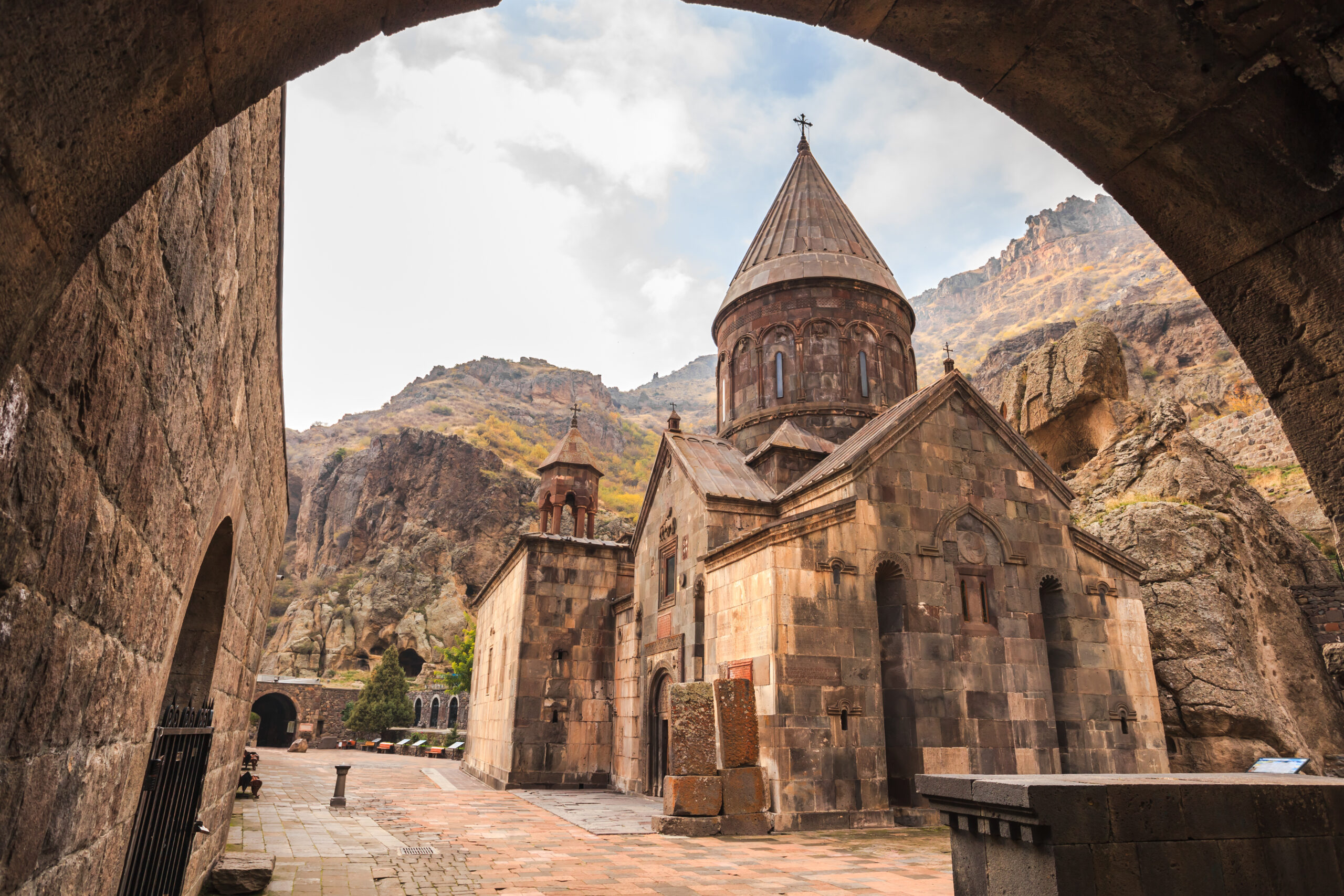
Kotayk Province of Armenia. Photo: Shutterstock.com
Armenia and Azerbaijan issued landmark joint statement
On the evening of December 7, Armenia and Azerbaijan issued an unexpected joint statement, confirming the shared view that “there is a historical chance to achieve a long-awaited peace in the region”. Baku and Yerevan also reconfirmed their intention to normalise relations and reach the peace treaty based on respect for the principles of sovereignty and territorial integrity” while agreeing to exchange 32 detained Armenian military servicemen for 2 Azerbaijani servicemen.
As Eurasianet.org pointed out, the statement was the first that did not bear the signature of any mediator working on the peace process between the two. The statement also announced Armenia’s support for Azerbaijan’s bid to host the 29th Session of the Conference of Parties (COP29) to the UN Framework Convention on Climate Change by withdrawing its candidacy. In return, Azerbaijan supports Armenia’s candidacy for Eastern European Group COP Bureau membership. This also marks the first time the two countries have publicly backed each other’s leadership in international bodies.
As stipulated by the statement, servicemen were exchanged on December 13 on the delimited conventional border of Azerbaijan and Armenia, on the border of Azerbaijan’s Gazakh district and Armenia’s Ijevan district. International actors, including the EU, USA and Russia, welcomed the statement.
Charles Michel, the head of the European Council, expressed his delight at a breakthrough in Armenia-Azerbaijan relations. He particularly welcomed the joint statement, highlighting the release of detainees and the unprecedented opening in political dialogue between the two countries. “Establishing and deepening bilateral dialogue between sides has been a key objective of the EU-led Brussels process: today’s progress is a key step,” he wrote on his X microblog.
The press statement from the United States Department of State expressed its welcome for the joint statement issued by the Armenian Prime Minister’s office and the Azerbaijani President’s administration. “The United States welcomes the announcement by Armenia and Azerbaijan of the release of two Azerbaijani and thirty-two Armenian detainees. This commitment represents an important confidence-building measure as the sides work to finalise a peace agreement and normalise relations. We commend Azerbaijani President Aliyev and Armenian Prime Minister Pashinyan for their joint efforts to lay the groundwork for a more peaceful and prosperous future for the people of the South Caucasus. The United States will continue strongly supporting efforts to reach a durable and dignified peace,” reads the press statement.
Maria Zakharova, the official representative of the Russian Foreign Ministry, emphasised that Russia welcomes the agreement between Baku and Yerevan on the release of Armenian and Azerbaijani soldiers, consistent with Russia’s idea of exchanging prisoners on the principle of “all for all.”
Sources:
-
ISAYEV Heydar, Eurasianet.com, “Armenia, Azerbaijan issue landmark joint statement”, https://eurasianet.org/armenia-azerbaijan-issue-landmark-joint-statement
-
Caucasus Watch, Azerbaijan, “Armenia Exchange Detained Soldiers in Gesture of Cooperation”,https://caucasuswatch.de/en/news/azerbaijan-armenia-exchange-detained-soldiers-in-gesture-of-cooperation.html
-
Caucasus Watch, “International Community Welcomes Armenia-Azerbaijan Joint Statement”,https://caucasuswatch.de/en/news/international-community-welcomes-armenia-azerbaijan-joint-statement.html
China emerges as Armenia’s second-largest trade partner
At the fifth conference, “Eurasian Studies in Modern China and Eurasia,” in Yerevan on December 8, Chinese Ambassador to Armenia Fan Yong announced that the trade turnover between China and Armenia exceeded 1.5 billion USD for nine months of 2023, reported Caucasus Watch.
“China is Armenia’s second-largest trade partner, with a large market for Armenian goods,” the diplomat noted. “In the first nine months of this year, the trade volume exceeded 1.5 billion USD, exceeding last year’s result by 30%,” Yun said. “More than 20 Armenian companies had earlier participated in the international export forum in Beijing,” he reminded.
The Chinese diplomat further pointed to the ever-expanding cooperation between the two countries in various projects. “For example, Chinese companies are involved in the construction of the North-South highway, solar energy projects, and re-equipment of the Armenian Public Television,” he added. Notably, the volume of mutual trade between Armenia and China in 2022 amounted to 1.43 billion USA, reminded Caucasus Watch.
Sources:
- Caucasus Watch, “China Emerges as Armenia’s Second-Largest Trade Partner with $1.5 Billion Turnover”, https://caucasuswatch.de/en/news/china-emerges-as-armenias-second-largest-trade-partner-with-15-billion-turnover.html

Mountains of Armenia. Photo: Shutterstock.com
Russia to revamp Armenia’s nuclear power plant
On December 15, Armenia and Russia signed a contract to modernize and extend the lifespan of Armenia’s Metsamor Nuclear Power Plant (NPP) until 2036. Armenian Prime Minister Nikol Pashinyan’s cabinet formally approved the contract during a weekly session held on December 21.
The Armenian government will pay a Russian company up to 65 million USD via a “budgetary loan” provided to the state-owned plant’s management. The latter will sign a relevant contract with Rusatom Service, which is part of Russia’s Rosatom state nuclear agency. Rusatom Service should upgrade Metsamor by 2026 in close coordination with Armenian nuclear energy specialists.
The Metsamor reactor, which generates roughly 40% of Armenia’s electricity, went into service in 1980 and was due to be decommissioned by 2017. Armenia’s former government decided to extend the 420-megawatt reactor’s life by ten years after failing to attract funding to construct a new and safer nuclear facility.
Russian and Armenian specialists essentially completed Metsamor’s first major modernization in 2021. Armenian officials have since repeatedly said that the Soviet-era facility, located 35 kilometres west of Yerevan, can safely operate until 2036.
The head of the International Atomic Energy Agency (IAEA), Rafael Grossi, praised those safety upgrades monitored by the UN nuclear watchdog when he visited Armenia and inspected Metsamor in October 2022.
As the reactor will be decommissioned in 2036, the Armenian government intends to build a new nuclear unit at Metsamor. Different estimates assert that constructing a new nuclear power plant or unit will take 6-10 years, meaning that construction work must be started in the next couple of years, writes Eurasianet.
It appears those construction works will be implemented by Rosatom, judging by Russian Deputy Prime Minister Alexey Overchuk’s remark on December 15 that negotiations were underway regarding new nuclear power units.
Sources:
-
SHAHVERDYAN Lillit, Eurasianet.org, “Russia to revamp Armenia’s nuclear power plant”, https://oc-media.org/russias-rosatom-to-extend-life-of-armenias-metsamor-nuclear-plant/
-
Azatutyun.am, “Russian Firm Contracted For Another Upgrade Of Armenian Nuclear Plant”, https://www.azatutyun.am/a/32730728.html
-
Armenianlife.com, „Armenia to Modernize Metsamor Nuclear Power”, http://www.armenianlife.com/2023/12/23/armenia-to-modernize-metsamor-nuclear-power/
Pashinyan and Aliyev discussed a peace treaty at the CIS Summit. Despite progress, serious obstacles persist
At the informal meeting of the Commonwealth of Independent States (CIS) Heads of State in St. Petersburg on December 27, President Ilham Aliyev had a one-on-one conversation with the Prime Minister of Armenia Nikol Pashinyan. According to Azernews, leaders discussed the Azerbaijan-Armenia peace agenda during the conversation.
Earlier on December 25, Russian presidential Spokesperson Dmitry Peskov told RIA Novosti that there are no plans for one-on-one meetings at the informal CIS summit, but all leaders may interact within the framework of the event in St. Petersburg. As Arminfo reminded, Moscow has repeatedly expressed its readiness to organize a high-level meeting between Armenia and Azerbaijan on its site. However, the Armenian side considered meeting on the Russian platform inappropriate, noting that the Western platform is more effective.
On December 25, it became known that Baku gave Yerevan a new package of proposals regarding the peace treaty. It was preceded by a series of notable statements by Azerbaijani and Armenian officials regarding the document, providing insight into the underlying logic of the developments in this agenda.
Azerbaijani Foreign Minister Jeyhun Bayramov recently expressed optimism about the process, noting that the peace treaty can become a document defining the principles between the two states, laying the foundation for good-neighbourly relations.
Meanwhile, Hikmet Hajiyev, assistant to the president of Azerbaijan on foreign affairs, claimed that the issue of border delimitation and demarcation can be separated from the agenda of the peace treaty. Armenia’s Parliament speaker, Alen Simonyan, responded to Hajiyev’s statements, not excluding that separating the two issues might be acceptable for Armenia.
Another persisting and serious obstacle, according to Civilnet.am, is the question of Armenian refugees from former de facto Nagorno Karabakh who fled the region in fear of violence from the Azerbaijani army and government. Civilnet.am stressed that an attempt to exclude this issue from the peace agreement is a logical step for Azerbaijan. “Baku aims to eliminate another problematic issue from the peace treaty agenda (similar to what was done earlier with Nagorno-Karabakh-related issues) and sign the document without making any concessions or commitments in this regard. Essentially, Azerbaijan seeks Armenia’s signature on the peace treaty without reaching an agreement on the principles related to the demarcation and delimitation process and the maps underlying that process”, writes the portal. “…such a scenario unfolding, several issues will persist even after the document is signed. We are particularly talking about the issue of enclaves and the withdrawal of Azerbaijani troops from the occupied territories of Armenia”, reads the article, adding that under such circumstances, “the peace treaty will be a framework document in which the parties agree on some principles rather than specific issues”.
Sources:
- Azernews.az, “President Ilham Aliyev discusses peace agenda with Armenian PM”, https://www.azernews.az/nation/219560.html
- MKRTCHIYAN Marianna, Arminfo.info, “Kremlin comments on the likelihood of Pashinyan-Aliyev bilateral meeting in St. Petersburg”, https://arminfo.info/full_news.php?id=81109&lang=3
- GRIGORYAN Tigran, Civilnet.am, “The peace agreement is unlikely to address any of the fundamental issues in the Armenia-Azerbaijan context”, https://www.civilnet.am/en/news/760905/the-peace-agreement-is-unlikely-to-address-any-of-the-fundamental-issues-in-the-armenia-azerbaijan-context/
Aliyev calls snap presidential election for February 2024
Azerbaijani President Ilham Aliyev announced on December 7 that Azerbaijan will hold snap presidential elections on February 7, 2024, a year before his fourth presidential term ends. On December 12, Azerbaijan’s ruling New Azerbaijan Party officially proposed Aliyev as its candidate. Two other parties have supported Aliyev’s bid. The Umid party, chaired by Igbal Agazada, and the Law and Justice party, led by Ali Insanov, have announced their intention to support the candidate from the ruling New Azerbaijan Party in the upcoming elections.
The Law and Justice party said in a statement that the decision to support Ilham Aliyev’s candidacy in the December 7 elections was made unanimously at an extended meeting of the party since the majority of its members declared their intention to vote for the re-election of the current head of state.
On the other hand, Azerbaijan’s two main opposition parties denounced the calling of a snap election as undemocratic and said they would not field candidates. The Popular Front Party of Azerbaijan (PFPA) said it would also urge voters to stay home. “We are for free, fair, democratic elections and will always demand fair competition. However, we will not participate in the falsified farce called ‘elections’ in this imitation of ‘democracy’,” PFPA leader Ali Karimli said.
The Musavat party said it would not put up a candidate but stopped short of calling for a boycott on February 7. Party leader Arif Hajily said Azerbaijan had not held a free election in three decades, and recent arrests of journalists and political activists showed the next one would be no different. He told Reuters that Musavat’s demands included free speech, freedom of assembly, the release of all political prisoners and reforms to the commission supervising the elections.
In 2009, a public referendum removed a limit on the number of terms that a president could serve. Another referendum held in 2016 extended the presidential terms to seven years. The 2016 referendum also created the office of vice president, a position that has been held by Aliyev’s wife, Mehriban Aliyeva, since 2017.
Sources:
-
AGHAYEV Ismi, OC Media, “Aliyev announces snap presidential elections for February”, https://oc-media.org/aliyev-announces-snap-presidential-elections-in-2024/
-
RFE/RL, “Azerbaijan’s Ruling Party Nominates President Aliyev For Snap Election”, https://www.rferl.org/a/azerbaijan-aliyev-snap-election/32727327.html
-
Xalqqazeti.az, “2 political parties support Ilham Aliyev’s candidacy for presidency”, https://xalqqazeti.az/en/siyaset/154729-political-parties-support-ilham-aliyevs
-
Reuters, “Opposition parties reject Azerbaijan’s snap election call as undemocratic”,
US diplomat visits Azerbaijan as bilateral tensions subside
Amidst heightened tensions in US-Azerbaijan relations, Assistant Secretary of State for European and Eurasian Affairs James O’Brien visited Azerbaijan on December 6. According to a statement from the US State Department, the purpose of the visit was to engage in discussions to strengthen bilateral ties with Baku and address the ongoing peace process between Azerbaijan and Armenia.
Aliyev’s reception of O’Brien was the first high-level meeting between the two countries since the sides mutually cancelled such visits last month over disagreements on Azerbaijan’s military offensive in Karabakh in September.
The sides stressed the importance of the visit “in terms of discussions on various aspects of bilateral relations and the exchange of ideas on regional issues,” according to the readout on Aliyev’s website. “Emphasising that Azerbaijan supported the regional peace agenda, President Ilham Aliyev said that after the end of the conflict [with Armenia] and full restoration of Azerbaijan’s sovereignty [over Karabakh], historic opportunities had arisen for the establishment of peace, noting that the United States could contribute to the process by considering the new realities,” the statement read.
The readout didn’t mention the recent US-Azerbaijani tensions, instead noting that the sides “described the resumption of reciprocal visits as a positive step for advancing bilateral relations.” O’Brien described his meetings as “positive and constructive” in a post on the X social media. He wrote that the US welcomes visits of Azerbaijani Central Bank governor and energy minister and that US State Secretary Anthony Blinken “looks forward to hosting” Bayramov and his Armenian counterpart Ararat Mirzoyan in Washington “soon for peace negotiations.”
The diplomatic strain intensified after remarks made by O’Brien during a House Foreign Affairs Committee Subcommittee on Europe hearing on November 15. At the hearing, O’Brien asserted that relations with Azerbaijan would not normalise until a peace agreement with Armenia was signed. In response, the Azerbaijani Ministry of Foreign Affairs declined proposed meetings with the Armenian Foreign Minister in Washington on November 20.
Sources:
-
Eurasianet.org, “US diplomat visits Azerbaijan as bilateral tensions subside”, https://eurasianet.org/us-diplomat-visits-azerbaijan-as-bilateral-tensions-subside
-
Xalqqazeti.az, “US State Department releases statement about O’Brien’s visit to Baku”, https://xalqqazeti.az/en/siyaset/152463-state-department-releases-statement-about
-
Turan.az, “What can change O’brien’s visit to Azerbaijan?”, https://turan.az/en/social/what-can-change-obriens-visit-to-azerbaijan
Azerbaijan continues to arrest journalists
Police have detained another journalists amidst an ongoing crackdown on media in Azerbaijan. The wave of detentions began in November as relations deteriorated between the US and state-run and pro-government media, signalled a hunt for “US spies” in the country that coincided with arrests of independent journalists.
According to Eurasianet.org, the US-Azerbaijani ties improved somewhat with the visit of a top State Department official, and the anti-American campaign died down in the media, but the arrests continue unabated. On December 13, Hafiz Babali, an investigative journalist and editor at the independent news agency Turan, was detained, and police searched his house. The following day, he was placed in pretrial detention for three months. The Interior Ministry told Turan that Babali was arrested as part of the criminal case launched against the investigative outlet Abzas Media. Babayev is partially blind and has three children.
Following his interrogation, Babali said he was asked about AbzasMedia’s management and finances. “I have used AbzasMedia as a platform to publish my research and investigative stories, and I think I have succeeded”, he told journalists in late November. “This research has fully covered and revealed the shortcomings and corruption in Azerbaijan’s society”.
At the time, Babali attributed the authorities’ crackdown on AbzasMedia to an early November investigation he made into companies allegedly linked to Ali Naghiyev, the head of Azerbaijan’s State Security Service, which had taken over a bank belonging to Vasif Talibov, the former head of Nakhchivan. “This was the last straw”, Babali told RFE/RL. “This is when they decided they had to stop it”.
Since the arrests at AbzasMedia, several others connected to independent media in Azerbaijan have also been rounded up. These include Ilhamiz Guliyev, a human rights activist and a former police officer who gave anonymous comments to AbzasMedia about the alleged practice of police planting drugs on suspects. Guliyev was arrested and charged with possessing a large quantity of methamphetamine.
Four people from Abzas – its director, deputy director, editor-in-chief, and a reporter – were put in pretrial detention on charges of smuggling after police allegedly found 40,000 EUR in cash in their Baku office. And several people who have worked with Abzas were interrogated.
Earlier this week, reporter and director of news outlet Kanal11, Teymur Karimov, was arrested and put in 4-month pretrial detention. Karimov told his lawyer that he denies the charge of blackmail against him and that he was tortured during his detainment.
Karimov was the third head of a media outlet to be arrested since the campaign, after Abzas’ Ulvi Hasanli and the chief of Kanal13, Aziz Orujov, who was put in 3-month pretrial detention on charges of illegal construction. Another journalist from Kanal13, Rufat Muradli, was placed under administrative detention for a month on charges of hooliganism and disobedience to police.
Two more media chiefs were arrested in the past weeks: Ibrahim Humbatov of Azerinfo.az and Arshad Ibrahimov of Dunyaninsesi, which is based in the western city of Ganja.
Sources:
-
Eurasianet.org, “Azerbaijan continues to arrest journalists”, https://eurasianet.org/azerbaijan-continues-to-arrest-journalists
-
AGHAYEV Ismi, OC Media, „Azerbaijan detains seventh journalist in ongoing media crackdown”, https://oc-media.org/azerbaijan-detains-seventh-journalist-in-ongoing-media-crackdown/
Information noise regarding the decree on the dissolution of the de facto government of Nagorno Karabakh
On December 21, Vladimir Grigoryan, the Assistant of Samvel Shahramanyan, the last de facto leader of Nagorno-Karabakh, said that the decree on the liquidation of Karabakh no longer exists. In just a couple of days, Grigoryan resigned without giving a reason for his decision.
On September 28, facing an onslaught by the Azerbaijani army, the de facto president of Nagorno Karabakh, Samvel Shahramanyan, signed an order to dissolve the government by the end of 2023. In his interview for RFE/RL’s Armenian language service, Grigoryan claimed that the Artsakh leader nullified the decree on October 19.
Grigoryan didn’t say why the nullification wasn’t publicized earlier. France 24 later wrote that Shahramanyan’s office in Yerevan described the September 28 decree as “empty paper”, adding: “No document can lead to the dissolution of the republic, which was established by people’s will.”
On December 25, while commenting on the interview for RFE/RL, Grigoryan said he was no longer an adviser to Shahramanyan. My interview with RFE/RL has given rise to various speculations,” Grigoryan said. “Therefore, it’s necessary to point out that I expressed my personal opinion, which does not reflect any official position at the moment. I’d also like to inform you that I am not Samvel Shahramanyan’s adviser,” he added.
Sources:
-
Caucasus Watch, “Nagorno-Karabakh’s Separatist Leadership Vows to Persist in 2024 Despite Challenges”, https://caucasuswatch.de/en/news/nagorno-karabakhs-separatist-leadership-vows-to-persist-in-2024-despite-challenges.html
-
Panorama.am, “Vladimir Grigoryan says no longer Artsakh presidential adviser”, https://www.panorama.am/en/news/2023/12/25/Vladimir-Grigoryan/2944141
-
France24, “Nagorno-Karabakh dissolution not valid, says Armenian separatist leader”, https://www.france24.com/en/asia-pacific/20231222-nagorno-karabakh-dissolution-not-valid-says-armenian-separatist-leader
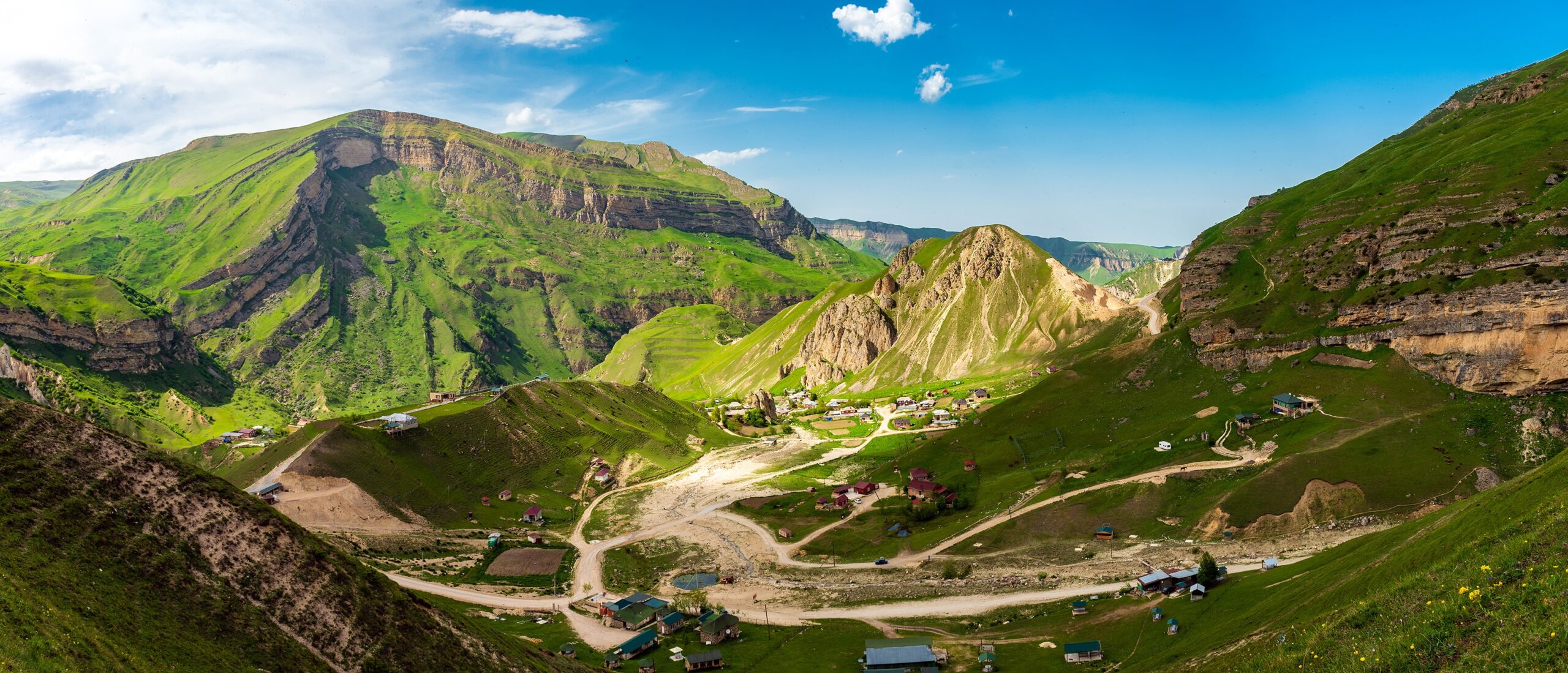
Panorama of the alpine village Laza in Azerbaijan. Photo: Shutterstock.com
Diplomatic tensions rise as Baku labels French embassy employees persona non grata
On December 26, Baku declared two employees of the French embassy persona non grata and summoned the French ambassador to Azerbaijan, Anne Bouillon, to the Ministry of Foreign Affairs. “It was brought to the attention of the French ambassador that two employees of the French embassy were declared persona-non-grata [undesirable person] by the Azerbaijani government due to their activities that were inconsistent with their diplomatic status and contradicted the 1961 Vienna Convention on Diplomatic Relations,” the information added.
According to the information, those persons were requested to leave the territory of Azerbaijan within 48 hours, and the corresponding note from the Ministry of Foreign Affairs was presented to the French ambassador. As a measure of reciprocity, Paris declared two Azerbaijani diplomats “persona non grata” the following day.
France “categorically refutes the allegations presented by Azerbaijan to justify its decision,” said the French Foreign Ministry in its statement. As Caucasus Watch reminds us, Azerbaijani officials have often criticized French officials in recent years. They accuse France of defending Armenia’s position. French officials do not accept such criticism.
According to Caucasus Watch, this coincides with the publication of articles in Azerbaijan’s state-affiliated media claiming to expose the French spy network in Azerbaijan. The articles mention that people allegedly conducting undercover work in prestigious international organizations have been detained and are under investigation. The reports also claim that Azerbaijan’s special services were presented with evidence and documents about the activities of the French in the South Caucasus, the Middle East, Ukraine, and Moldova.
Sources:
- Caucasus Watch, “Diplomatic Tensions Rise as Baku Labels French Embassy Employees Persona Non Grata”, https://caucasuswatch.de/en/news/diplomatic-tensions-rise-as-baku-labels-french-embassy-employees-persona-non-grata.html
- AA.com, “France declares 2 Azerbaijani diplomats ‘persona non grata’”,https://www.aa.com.tr/en/europe/france-declares-2-azerbaijani-diplomats-persona-non-grata-/3094147#:~:text=France%20on%20Wednesday%20declared%20two,Paris%20on%20the%20same%20day.
Baku approved new living wages
Azerbaijani President Ilham Aliyev has ratified the Law “On the Subsistence minimum in the Republic of Azerbaijan for 2024”, which fixes adjustments to the subsistence minimum for various socio-demographic groups. The legislation defines the living wage for 2024.
The living wage in the country for next year is set at 270 manat (158.8 USD), for the working population: 287 manat (168.8 USD), for retirees: 222 manat (130.59 USD), for children: 235 manat (138 USD). The limit of the need criterion for 2024 to assign targeted state social assistance is approved in 270 manat.
These figures represent an increase of 9.7% compared to the 2023 standards, which were set at 246 manats for the general population, 261 manats for the able-bodied, 199 manats for pensioners and 220 manats for children.
Sources:
-
Turan.az, “Azerbaijan has raised living standards by 9.7% for 2024”, https://turan.az/en/economics/azerbaijan-has-raised-living-standards-by-97-for-2024-775741
-
Trend.az. “Azerbaijani parliament approves living wage, need criterion for 2024”, https://en.trend.az/azerbaijan/society/3833063.html
Georgia awarded an EU candidate status
On December 14, the European Council decided to grant EU candidate status to Georgia. The Council also agreed to open accession negotiations with Ukraine and Moldova. It will open negotiations with Bosnia and Herzegovina once the necessary degree of compliance with the membership is reached, tweeted Charles Michel, the President of the EU Council.
The announcement came despite strong opposition from Hungary – and the fact that Ukraine and Georgia are partially occupied by Russia, which also has troops deployed in Moldova’s Transnistria region.
Thousands of Georgians gathered in Tbilisi on December 15 to celebrate at and around Freedom Square. “The EU and integration with Europe is important for us. Not only will it be a security guarantee for us and enable the country to get stronger economically, but it is also important for other values, including sports and culture, among others,” said Erekle Sarishvili, a student who participated in the rally. “We, the young generation, have fought for this result, but we also need to remember the older generations that brought Georgia here.”
Georgia’s Prime Minister, Irakli Gharibashvili, congratulated the nation, saying, “this historic victory belongs to you, to our undefeated, unbroken, freedom-loving Georgian people.” By opening membership talks with Ukraine and Moldova and offering Georgia candidate status, the EU has sent “a very important message to Russia,” Natia Seskuria, director of the Regional Institute of Security Studies in the Georgian capital Tbilisi, said.
Parties from the whole Georgian political spectrum welcomed and hailed the decision. The President of Georgia, Salome Zurabishvili, called the decision a “monumental milestone for Georgia”.
The opposition United National Movement leader, Levan Khabeishvili, congratulated Georgia on the European Council’s decision and emphasised the contribution of now-imprisoned former president Mikheil Saakashvili to Georgia’s EU path. “The end of his political persecution is approaching, and in European Georgia, we will have no political prisoners held hostage by the Kremlin agents,” Khabeishvili said, adding that “we have a great battle ahead of us, and I am sure that the Georgian people will carry this victory to the end.”
Giorgi Vashadze of opposition Strategy Aghmashenebeli congratulated the people of Georgia, noting that “today is really a very big and historic day! Today is the day when the European Union made an unprecedented exception in relation to us – Georgia, which has no land connection with the European Union, received the status of a candidate for the European Union.” Vashadze added that the European Council’s decision is the merit of the struggle of the Georgian people.
Sources:
-
Civil.ge, “BREAKING: Georgia Granted EU Candidate Status”, https://civil.ge/archives/574502
-
Civil.ge, “Georgian Politicians Hail European Council Decision to Grant Georgia EU Candidate Status”, https://civil.ge/archives/574516
-
Euronews.com, „Georgia celebrates gaining EU candidate status”, https://www.euronews.com/2023/12/16/georgia-celebrates-gaining-eu-candidate-status
-
Politico, “Georgians say they want to join Europe, but not like this”, https://www.politico.eu/article/georgia-european-union-russia-candidate-status-bidzina-ivanishvili-mikhail-saakashvili/
Nika Melia to launch his party
On December 7, Nika Melia, the former leader of the United National Movement (UNM), Georgia’s main opposition party, officially left the party and announced the formation of his own. At a briefing, Melia said the UNM had made “informal management and behind-the-scenes influences” its political standard and accused the party of being politically corrupt. “In recent months, I have done everything possible to ensure that the principles I hold dear prevail in the ‘National Movement.’ In this corrupt political system in the country, politicians try to make immorality a political standard, a prerequisite for success. Politicians who share this standard convince each other that they will achieve more by abandoning principles than sticking to them. Then all such politicians together try to convince the people of this,” he added.
Former leader of the UNM also discussed the moral need to overthrow “Ivanishvili’s regime”: “Yes, I am leaving. I am moving forward to the future and leaving the past in the past. The history of Georgia will be written by the Georgian people, not by the elite that currently controls this nation.”
Melia’s announcement came following several months of silence from the former chair. It was also preceded by a large outflow from the party, with around 100 members and local officials from around the country leaving the party.
Levan Khabeishvili, the new leader of the UNM, publicly announced on November 27 the expelling of Nika Melia from the party during a live television broadcast. Clearly stating, “No, he [Melia] is not a member of the party,” Khabeishvili responded to a journalist’s handwritten query with his distinctive signature. With UNM party members steadily departing the National Movement daily (On December 6, 15 more members of the Kakheti UNM organisation left the party), there’s mounting pressure on Levan Khabeishvili to step down from his position.
Levan Khabeishvili defeated the incumbent, Nika Melia, to become the new leader of the opposition UNM party in January 2023. The winner received 52.58% (21,656 votes), against Melia’s 40% (16,476 votes). The UNM held the election through an electronic voting system from January 28 to January 30.
Some opposition politicians have already expressed readiness to cooperate with Melia in the future. Lelo MP Salome Samadashvili said that Melia is a valuable politician. “Lelo will cooperate with everyone who believes that we need to defeat the Russian regime, but the future does not mean restoring the one-party rule of the National Movement party,” she noted. EuroOptimists MP Roman Gotsiridze noted that Melia’s party will be one of the serious opposition parties, a serious player is emerging who will strengthen the creation of the number one political union. According to him, Melia’s move was the only correct decision.
Sources:
-
Caucasus Watch, “Nika Melia to Launch His Own Party”, https://caucasuswatch.de/en/news/nika-melia-to-launch-his-own-party.html
-
Civil.ge, „Former UNM Chair Quits Party, Reveals Plans to Launch his Own”, https://civil.ge/archives/573187
-
SHOSHIASHVILI Tata, OC Media, “Former Georgian opposition leader Nika Melia to form new party”, https://oc-media.org/former-georgian-opposition-leader-nika-melia-to-form-new-party/
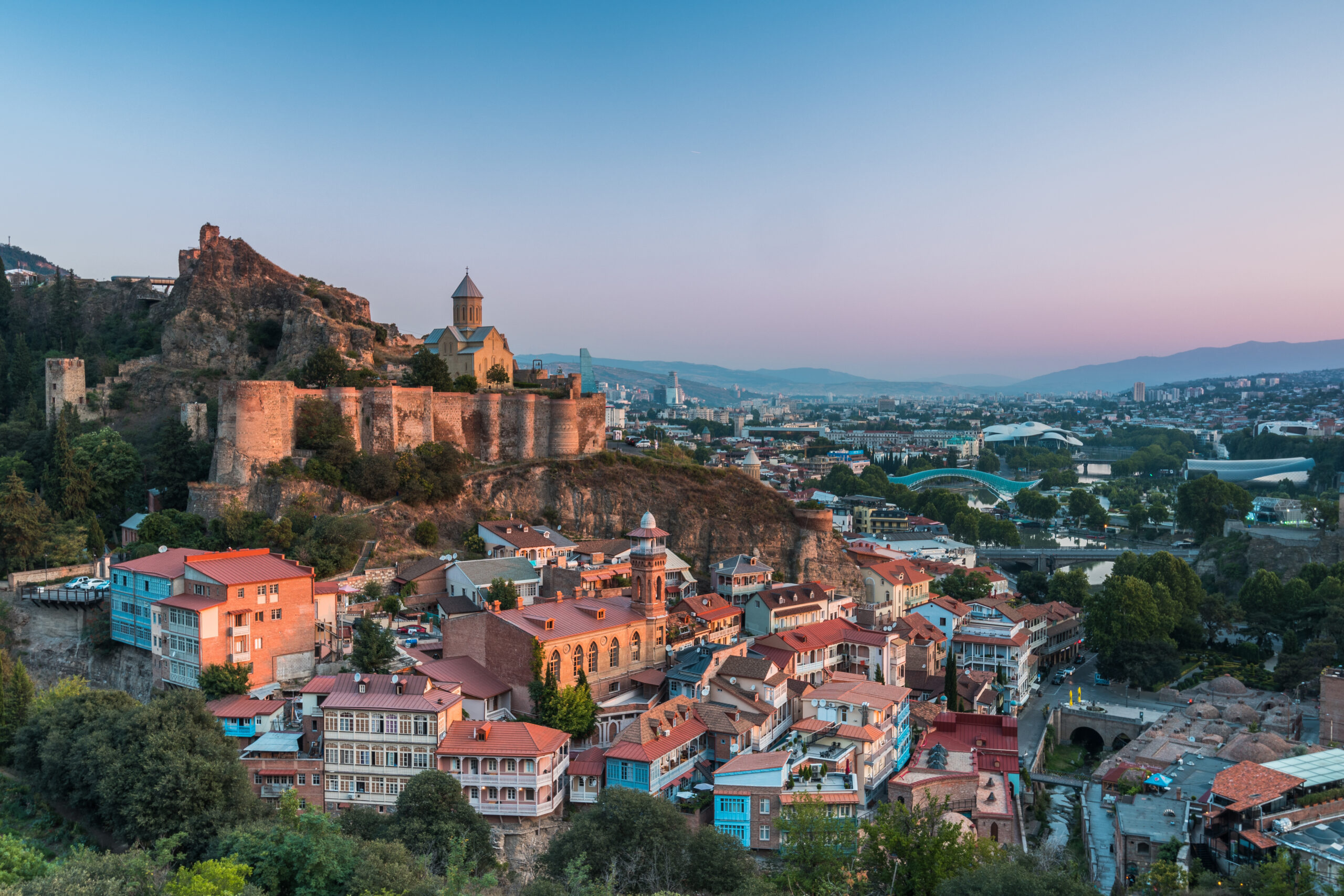
Tbilisi, Georgia. Photo: Shutterstock.com
Bidzina Ivanishvili returns to politics once again
Bidzina Ivanishvili, the billionaire founder of the ruling Georgian Dream party, has announced his return to politics as the party’s “honorary chair”. Ivanishvili announced his decision during a Georgian Dream party congress in Tbilisi on December 30.
“Exactly three years ago, I announced to the public my decision to distance myself from active political processes. Now, three years later, by my own decision, I’m returning to political life in the role of the party’s honorary chair”, said Ivanishvili, as cited by OC Media.
Ivanishvili claimed that he did not enter politics for wishing to have a leadership position but with the belief that it was in the interest of the country and the people, and left politics with the belief that he had “completed the mission” and that the criminals would never get back the ambition to return to power. However, he said, “the criminal political system has stronger roots than it seemed.” Therefore, he first had to return to politics in 2018.
In this context, he recalled the words of the then-EU ambassador, who told Ivanishvili that “without your return, nothing would have remained of the ruling party.” He said he had fulfilled his “mission” and put the ruling team in order. Then, he left politics again.
Ivanishvili recalled former Prime Minister Giorgi Gakharia’s “act of betrayal” and said he had to step in and help the “team” with advice; otherwise, he argued, the consequences for the country could have been grave.
Since then, Ivanishvili said, he has been in contact with 2-3 Georgian Dream leaders, which has facilitated “the healthy processes in the [ruling] team.” He claimed this was a normal practice in many democratic countries [when a former leader gives “advice” to the ruling team].
According to Ivanishvili, Georgia faces many challenges right now, and the geopolitical situation is difficult; therefore, even the slightest mistake by the ruling authorities can have serious consequences.
Reacting to Ivanishvili’s return, Irakli Garibashvili, Prime Minister of Georgia, claimed that all members of the ruling party listened to his speech and “there are no more questions”.
Georgian opposition “welcomed” Ivanishvili’s return as proof that he never left Georgian politics and continued to influence the ruling party from the background. “I would like to say once again what I have said many times before, and today it was finally confirmed that, yes, the Russian oligarch never left Georgian politics. Today, he finally confirmed the informal rule in the country and once again confirmed his fear that changes are inevitable in 2024 with the broad participation of Mikheil Saakashvili and the United National Movement,” said Sopo Japaridze from the United National Movement.
According to Giorgi Vashadze from Strategy Agmashenebeli, Ivanishvili returned because he was afraid of the ongoing decrease in the number of Georgian Dream supporters and “for his personal welfare and security”.
Source:
-
KINCHA Shota, OC Media, “Ivanishvili announces return to politics”, https://oc-media.org/ivanishvili-announces-return-to-politics/
-
Civil.ge, “Bidzina Ivanishvili Returns to ‘Protect the Government from Human Temptation’”
-
Civil.ge, „Reactions to Bidzina Ivanishvili’s Formal Return to Politics”, https://civil.ge/archives/576236
De facto Abkhazia approves transfer of Pitsunda „dacha” to Russia
On December 27, the de facto Parliament of Abkhazia ratified a deal transferring the Pitsunda (geo. Bichvinta) “dacha” to Russia’s Federal Protective Service (FSO) for 49 years. The decision sparked ire in Georgia and mass protests in de facto Abkhazia. De facto Abkhazian Parliament included several articles in the agreement requested by Abkhazian opposition activists that would guarantee the termination of the deal if the FSO donates, sells, or transfers the state dacha to a third party.
In addition, the FSO cannot construct new buildings or facilities on the leased territory without Abkhazia’s prior approval. De facto parliament was expected to convene to ratify the deal at 11:00 on December 27, with protesters gathering around government buildings and the parliament on December 26 to prevent police from cordoning off the parliament and barring protesters from attending the session.
However, 28 MPs arrived at parliament after midnight, with the vote taking place behind closed doors in the early hours of December 27. Critics of the controversial transfer have said that parliament chose to ratify the agreement in the early morning to avoid protests outside parliament.
Hundreds of demonstrators have been rallying in front of the de facto parliament’s building in the regional capital, Sukhumi, since December 26, demanding that the deal be scrapped immediately. Asida Shakryl, a former de facto ombudswoman of Abkhazia, called the move illegal. “Lawmakers have ignored the constitution of the Republic of Abkhazia…. They have to explain why they decided to discuss the issue at night. They have to justify the legitimacy of that sort of session,” Shakryl said.
Opposition politician Alkhas Jinjolia said on December 26 that the rally in front of the de facto parliament’s building would continue until the protesters’ request to cancel the deal was met. Abkhazia’s de facto Foreign Minister Inal Ardzinba said earlier that the deal on handing the resort to Russia was “legal and corresponded to international law.”
Russia’s envoy to the breakaway region, Mikhail Shurgalin, has said that, according to the deal, the land on which the resort is located will not be owned by Russia.
“The territory will be rented [by Russia] for 49 years. Only buildings will be owned [by Russia], and their maintenance and repair work will be conducted by [Russia’s] Federal Guard Service,” Shurgalin said earlier.
The Georgian Foreign Ministry condemned the deal on handing the Pitsunda (Bichvinta) complex of holiday homes to Russia, calling it “another illegal act and the continuation of Russia’s policy of occupation of the indivisible regions of Georgia, which grossly violates the fundamental principles of international law.”
“The Ministry of Foreign Affairs of Georgia appeals to the international community to properly assess this new illegal step by the Russian Federation aimed at encroaching on the sovereignty and territorial integrity of Georgia,” the ministry said in a statement.
Georgian President Salome Zurabishvili also condemned what she called “another land grab by Russians in Georgian territories…and their creeping annexation policies.”
According to Giorgi Gakharia, leader of the opposition For Georgia party, “Russia took another step towards annexation of occupied Abkhazia against the background of Georgian Dream’s policy of “pragmatic silence.” Gakharia said that the occupation regime in Sokhumi, accommodating Russia’s request, gave it the Bichvinta resort “totally neglecting the will of Georgian and Abkhaz people.” “Such “decisions” are illegal. Together with our Abkhaz compatriots, we should reclaim back our land.”
Sources:
-
OC Media, “Abkhazia approves transfer of Pitsunda dacha to Russia”, https://oc-media.org/abkhazia-approves-transfer-of-pitsunda-dacha-to-russia/
-
RFE/RL, “Abkhazia OKs Handing State Resort Over To Russia, Triggering Protests”, https://www.rferl.org/a/georgia-abkhazia-state-resort-russia-/32749083.html
-
Civil.ge, “Reactions to Transfer of Occupied Abkhazia’s Bichvinta Dacha to Russia”, https://civil.ge/archives/575845

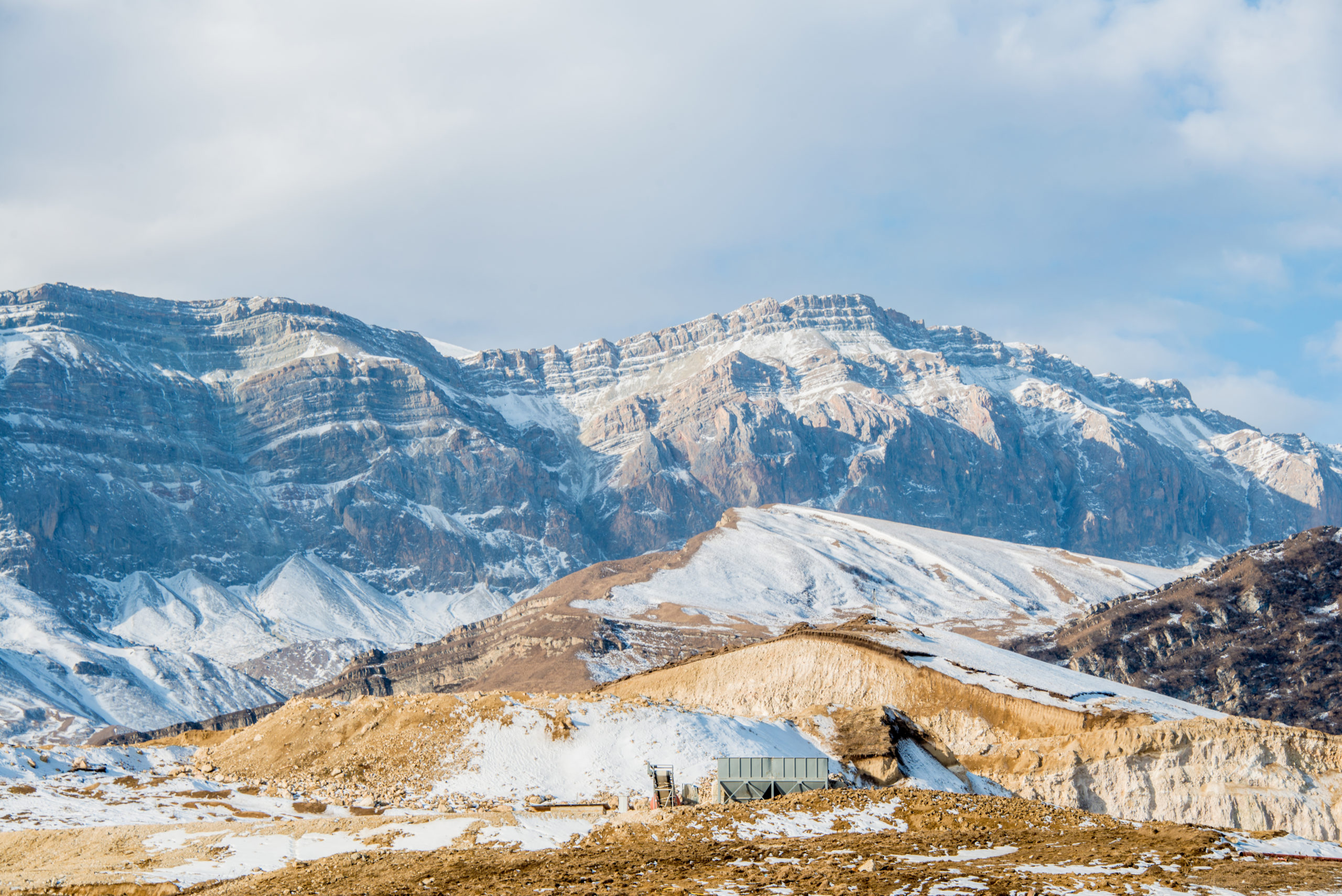
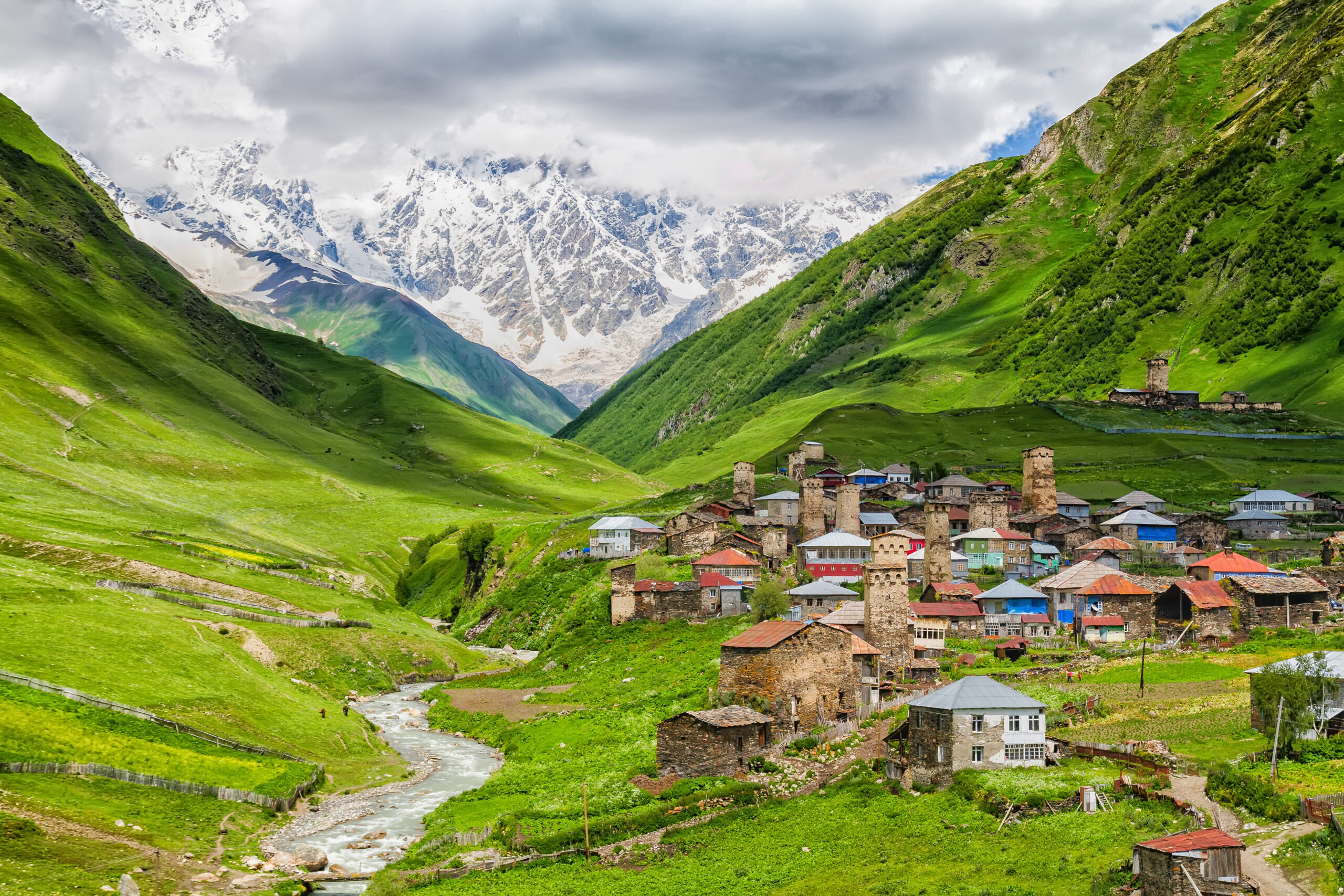
Contact us